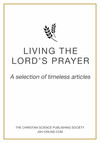

Are you sure?
This bookmark will be removed from all folders and any saved notes will be permanently removed.
"Thy will be done"
In the spiritual interpretation of the line, "Thy will be done in earth, as it is in heaven," from the Lord's Prayer, Mrs. Eddy has written in "Science and Health with Key to the Scriptures" (pp. 16, 17), "Enable us to know,—as in heaven, so on earth,—God is omnipotent, supreme." She also says (p. 3), "We admit theoretically that God is good, omnipotent, omnipresent, infinite, and then we try to give information to this infinite Mind." In the first reference we have a clear exposition of the spiritually scientific view of prayer; in the second, the false nature of the human concept of prayer is pointed out. The realization that God is omnipotent, ever expressing His divine will, brings thought into harmony with His law, and corrects the errors of human belief with the truth of being, thus healing and saving mankind. On the other hand, the effort to inform God of that which we desire humanly, and to plead for its manifestation, is to "ask amiss."
We sometimes seem to fail in demonstration because we endeavor "to give information to this infinite Mind." We should not attempt to outline the course of divine justice and mercy, but learn instead to recognize God's ever operative law. We should recognize the blessing of ever present Love, instead of endeavoring to bring about a change in our affairs or environment through the belief in human will. Human will, which is the supposititious antipode of the divine will, insists that man can be separated from God; but the understanding of the divine all-power silences mortal will and demonstrates man's perfect unity with God.
Human will stands for all that is opposed to the divine Mind. Every material belief is the offspring of this so-called will. It was the belief in human will that led the prodigal son to leave his father's house. It was human will that seemed to deprive him of his substance and heritage, and took him into the illusive, deceptive paths of mortal error until he sank into companionship with swine. Then, when the undesirability, yes, the nothingness of the belief in a life apart from God was seen, he came to himself and arose from his material sense of life and pleasure. Was not the desire to become as one of his father's servants the humble recognition of the necessity for obedience to the divine will? And this recognition awakened him to his privileges as a son. On the other hand, the willful self-righteousness of the elder brother was rebuked, and the blessings of obedience clearly pointed out in the father's words, "Son, thou art ever with me, and all that I have is thine."
Enjoy 1 free Sentinel article or audio program each month, including content from 1898 to today.
JSH Collections
This article is included in:
2017 - DIGITAL COLLECTION
Living the Lord's Prayer: A selection of timeless articles
JSH-Online has hundreds of pamphlets, anthologies, and special editions for you to discover.

September 12, 1925 issue
View Issue-
A Timely Illustration
MARY ALICE DAYTON
-
Encouragement
EDMUND HOGG
-
Authority
JESSIE MAUD BAKER
-
Thinking Aright
FRED YOULD
-
"Thy will be done"
GENEVIEVE P. OLSON
-
True Philosophy
BERYL N. ROSENAU
-
The Fruit of Obedience
HANNAH M. FRANKEN
-
"Peace I give unto you"
ELIZABETH HAYWARD GARDNER
-
With reference to an article in your recent issue headed,...
Arthur F. Algie, Committee on Publication for China,
-
The writer of an article published in your paper attempts...
Frank J. Linsley, Committee on Publication for the State of Connecticut,
-
In the report of remarks by a bishop on spiritual healing,...
Miss Florence B. Russell, Committee on Publication for Hampshire, England,
-
The report in Hjemmenes Vel of Dr. Harald Schjelderup's...
Mrs. Gudrun G. Jensen, Committee on Publication for Norway,
-
Christian Science organizations, as such, do not endorse...
Hugh S. Hughes, Committee on Publication for the State of Wisconsin,
-
A recent issue of your paper, in giving an account of the...
W. Truman Green, Committee on Publication for the State of Florida,
-
The term "spiritual healing" is applied to-day to almost...
William K. Primrose, Secretary to the District Manager of Committees on Publication for Great Britain and Ireland,
-
Demonstration
LOUISE MC KEE HIBBS
-
"The El Dorado of Christianity"
Albert F. Gilmore
-
"Heredity is not a law"
Duncan Sinclair
-
"Finding all in God"
Ella W. Hoag
-
The Lectures
with contributions from John J. Flinn, Walter S. Cross, Lucia C. Coulson, Florence Glegg, Walton Hubbard, Pett McMahan, Frederick C. Hill, Martha E. Hecker, William E. Brown, Frank A. McCoy
-
All mankind wants to progress, but the meaning of this...
Mae Paul Davenport
-
Truly the praises of Christian Science are beyond human...
Charles Edwards Jackson
-
I was born and raised in the beliefs of ecclesiastical...
Jennie B. Ginet
-
I have often wished to add my gratitude to that of the...
Mary P. Gingell
-
In the fourth chapter of Deuteronomy we read: "When...
Alice Weeks Bradley
-
Having been a student of Christian Science for over nine...
Cecil Adelaide Alderson with contributions from Thomas George Alderson
-
As many others have done, I turned to Christian Science...
Stella A. Pettit
-
Signs of the Times
with contributions from O'Neill


